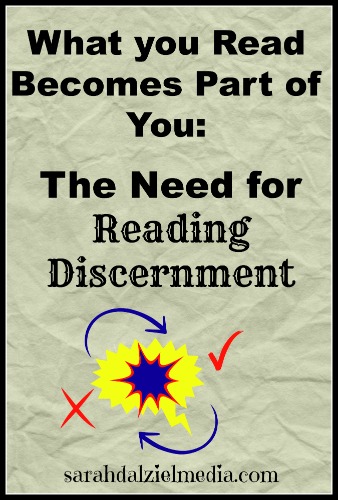Every book you read, every film you watch, and every post you see can either be uplifting for you, or pull you down. Part of every book you read becomes part of you. It is those parts, the hero tales, or the discouraging stories of grief, that will shape your mind and your emotions. Even at 22, I can still remember story quotes and points from books I read when I was 10, The Swiss Family Robinson, C. S. Lewis’ Screwtape Letters, and the Christian Romance novels that I quit reading because I didn’t like what they did to my emotions, or expectations.
Now really, is it possible that casual reading habits could really shape your life, emotions, or expectations?
Oscar Wild said, “It is what you read when you don’t have to, that determines what [who] you will be when you can’t help it.” 
Now, I love fiction and enjoy devouring fantasy stories. If I had my way, I’d try and make a full-time income from beta-reading fantasy stories. However, it was in casual conversation that I suddenly realized something strange. All my writing is shaped by what I have read. Every fiction story I envision or craft is somehow influenced by what I have read, which means that every book I’ve read has become part of me, part of my mind.
Now, while I’m happy about that with such epics as Tolkien’s The Lord of the Rings, I’d rather not have books such as “My Sister’s Keeper” stuck in my mind for the rest of my life. As a believer, and now someone pursuing full-time service, I realize that I need to watch what my eyes consume – books, movies, and even posts on social media sites.
Determining What is Good:
In any given situation, being aware that danger exists is always half the challenge. The other half is deciding what to do with that awareness.
Since every media outlet we consume becomes part of us, even if it is abandoned in an unused brain synapse, there is a need to be aware. However, that awareness does not mean only reading non-fiction, or completely abandoning fiction genres that you’d normally read and consider good.
Now, as a Beta-reader I often end up with books that I would rather not read (or at least scenes that I’d rather not read), which is where skimming and skipping come into play. Skip and scan until it is safe to continue reading. For myself, I avoid only two genres, horror and erotica. I do not believe that we need to give the enemy any extra room in our heads. God does not give us a “spirit of fear, but of love, courage, and a sound mind” (Cite).
If what one is reading is not giving one a sound mind and courage, but increasing fear, then maybe it needs to change?
Remember, some genres can span a wide range of tastes and topics. The Chronicles of Narnia are fantasy, and are awesome Christian reading for children. “This Present Darkness” and “Piercing The Darkness” are a little bit more challenging urban fantasy, but are awesome for teen reading.
Fantasy may be escapism, but as Tolkien said, “that is its glory” and fantasy writers need to “try to take as many with us as we can” on that escape. It is not the escape that is bad, escaping to a place with heroic characters, desperate battles, and ideas bigger than oneself can be a very good thing. Mostly because it pulls oneself beyond one’s immediate circumstances and ignites the imagination to act.
Remember, you can find negative books in the non-fiction section just as much as in the fiction area. A genre designation does not make a book inherently good or bad. However, I would like to encourage you to always use discernment when choosing what books to spend your time on. Read the cover or description, and the first few pages, or the table of contents, to make sure it will be uplifting.
Back to You:
Have you ever thought that part of every book you read will become part of who you are? If it’s a new idea, do you agree or disagree with it? Would you agree that believers should be watchful of what they consume in their reading?
Leave a comment, I love hearing from you!

Leave a Reply